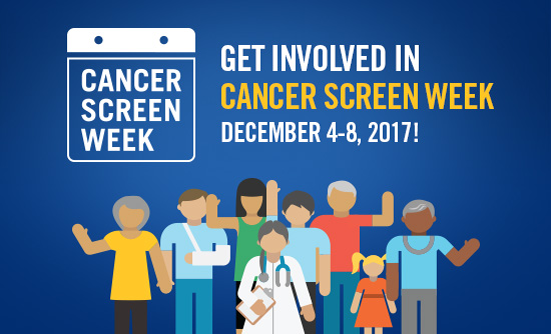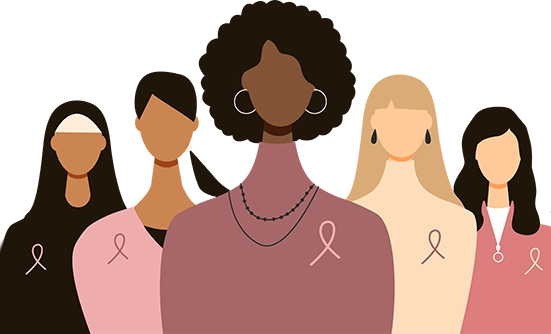According to the American Cancer Society, screening increases the chances of catching certain cancers early, when they are most likely to be treated successfully.1 In the last year, approximately 600,000 people were expected to die from cancer, yet many of those lives could have been saved through earlier detection.1,2 We want to make sure you stay on top of your health and know what screening tests may be right for you and your loved ones.
This week is Cancer Screen Week—a nationwide public health initiative to increase awareness of the benefits of early cancer detection. Taking control of your future starts with receiving recommended screening tests. Here are some easy steps you can take:
- Visit www.GetScreenedNow.org to find out what cancer screening tests may be right for you, and pledge to make an appointment to talk to your doctor.
- Spread the word about Cancer Screen Week and be a part of this collective effort to save more lives from cancer.
Everyone can play a role in the fight against cancer.
Who Should Be Screened for Cancer?
Many of the common cancers may be caught early with screening, and have recommended guidelines for those who are considered most at risk. Learn more about the tests and screening guidelines recommended by the American Cancer Society, and talk with a healthcare professional about your risk for cancer and the best screening plan for you.
A regular mammogram is one of the most important things a woman can do to find breast cancer early—when it’s small, hasn’t spread, and may be easier to treat.6, 7
- Women ages 40 to 44 should have the choice to start annual breast cancer screening with mammograms if they wish to do so.
- Women ages 45 to 54 should get mammograms every year.
- Women 55 and older should switch to mammograms every two years, or can continue yearly screening.
- Screening should continue as long as a woman is in good health and is expected to live 10 more years or longer.
- A small percentage of women are at a higher risk for breast cancer and should be screened with MRIs along with mammograms.
The Pap test can help catch cervical cancer early, when it’s small and may be easier to treat. It can also prevent cervical cancer by finding pre-cancerous cells so they can be treated before they become cancer. The human papilloma virus (HPV) test finds HPV infections which may increase the risk of cervical cancer.8
- All women should begin cervical cancer screening at age 21. Women aged 21-29 should have a Pap test every three years.
- Women over 30 should get an HPV test done at the same time as their Pap test. They should have these tests every five years.
- Even if a woman has gotten the HPV vaccine, she still needs to get regular Pap and HPV tests.
- Women over age 65 who have had regular screening in the past 10 years with normal results should not be tested for cervical cancer.
Colorectal cancer can often be prevented or found at an early stage, when it’s small and may be easier to treat, with regular screening.9,10
- People 50 or older should be screened regularly for colorectal cancer. There are several effective tests available. People at high risk may need to start screening at a younger age and have it more frequently.11
Lung screening is done with an annual low-dose CT scan (LDCT) of the chest.12 Screening can help find cancer early, when it’s small and may be easier to treat.1
- Screening is recommended for people 55 to 74 years of age who are in good health, and have at least a 30 pack-year smoking history AND are either still smoking or have quit within the last 15 years.12
Prostate cancer can often be found early using a simple blood test, but it’s not clear if the benefits of testing all men for prostate cancer outweigh the risks, such as finding (and treating) cancers that probably never would have caused any problems.11
- Starting at age 50, men should talk to a healthcare provider about the pros and cons of testing so they can decide if testing is the right choice for them.11
- African American men or men who have a father or brother who had prostate cancer before age 65 should discuss prostate cancer screening with a healthcare provider starting at age 45.11
Read Ben Stiller's story of how a PSA screening saved his life.
Some people have a higher risk of getting skin cancer than others, but anyone can get melanoma and other types of skin cancer. Although the American Cancer Society does not have screening guidelines for skin cancer, knowing your own skin is important to finding skin cancer early.13
- Know the pattern of moles, blemishes, freckles, and other marks on their skin to notice any new moles or changes in existing moles.
- Regular skin exams are especially important for people who are at higher risk of melanoma, such as people with many unusual moles, people with a strong family history of melanoma, and people who have had melanoma before.
References
- American Cancer Society. Cancer Facts and Figures 2017. www.cancer.org/research/cancer-facts-statistics/all-cancer-facts-figures/cancer-facts-figures-2017.html. Accessed August 22, 2017.
- National Cancer Institute. Cancer Screening Overview (PDQ®) Health Professional Version. www.cancer.gov/about-cancer/screening/hp-screening-overview-pdq. Accessed August 22, 2017.
- American Cancer Society. Cancer Screening Guidelines 2017. www.cancer.org/healthy/find-cancer-early/cancer-screening-guidelines.html. Accessed Aug. 11, 2017.
- National Cancer Institute Trends Progress Report. https://progressreport.cancer.gov/trends. Accessed Aug. 23, 2017.
- U.S. Department of Health and Human Services. Healthy People 2020. www.healthypeople.gov/2020/topics-objectives/topic/cancer. Accessed Aug. 23, 2017.
- American Cancer Society. American Cancer Society Recommendations for the Early Detection of Breast Cancer. www.cancer.org/cancer/breast-cancer/screening-tests-and-earlydetection/american-cancer-society-recommendations-for-the-early-detection-of-breast-cancer.html. Accessed Aug. 23, 2017.
- American Cancer Society. Breast Cancer Screening Resources. www.cancer.org/cancer/breast-cancer/breast-cancer-screening-resources.html. Accessed Aug. 23, 2017.
- American Cancer Society. How to Prevent Cervical Cancer or Find it Early. www.cancer.org/latest-news/cervicalcancer-testing-can-find-it-early-and-even-prevent-it.html. Accessed Aug. 23, 2017.
- American Cancer Society. Five Myths About Colorectal Cancer. www.cancer.org/cancer/colon-rectal-cancer/five-myths-about-colorectal-cancer.html. Accessed Aug. 23, 2017.
- American Cancer Society. Can Colorectal Polyps and Cancer Be Found Early? www.cancer.org/cancer/colon-rectal-cancer/detection-diagnosis-staging/detection.html. Accessed Aug. 23, 2017.
- American Cancer Society. American Cancer Society Guidelines for the Early Detection of Cancer. www.cancer.org/healthy/find-cancer-early/cancer-screening-guidelines/american-cancer-society-guidelines-for-the-early-detection-of-cancer.html. Accessed Aug. 25, 2017.
- U.S. Preventive Services Task Force. Final Recommendations Statement Lung Cancer: Screening. www.uspreventiveservicestaskforce.org/Page/Document/RecommendationStatementFinal/lung-cancer-screening. Accessed Aug. 22, 2017.
- American Cancer Society. Can Melanoma Skin Cancer Be Found Early? www.cancer.org/cancer/melanoma-skin-cancer/detection-diagnosis-Accessed August 23, 2017.














